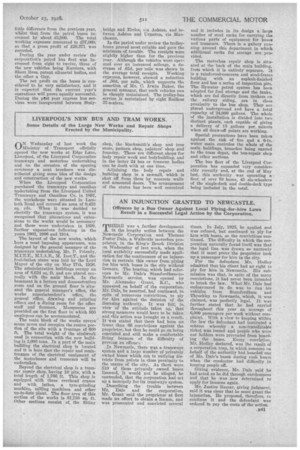AN INJUNCTION GRANTED TO NEWCASTLE.
Page 25

If you've noticed an error in this article please click here to report it so we can fix it.
Offences by a Bus Owner Against Local Plying-for-hire Laws Result in a Successful Legal Action by the Corporation.
THERE was a further development in the lengthy action between the Newcastle Corporation and Thomas Foster Dale, a Walbottle motorbus proprietor, in the King's Bench Division on Wednesday of last week, when the . local authdrity successfully made application for the continuance of an injunction to restrain this owner from plying for hire with buses in the city without licenoca. The hearing, which bad reference to Mr. Dale's Stamfordham-toNewcastle service, was opened by Mr. Alexander Grant, K.C., who appeared on behalf of the corporation. Mr. Dale, he asserted, had confirmed, in spite of numerous convictions, to ply for hire against the decision of the licensing authority. It was felt, in view of the attitude taken up, that strong measures would have to be taken and.this action was brought as a result. It was stated that there had been no fewer than 66 convictions against the Proprietor, but that he could go on being convicted and stilt make a comfortable living because of the difficulty of proving an offencs.
In Newcastle,. there was a tramways system and a large number of privately owned hisses which ran to outlying districts from points in close proximity to the centre of the city. As there were 510 of these privately owned buses licensed, it would not be alleged, he contended, that the corporation had set up a monopoly for its tramways system.
Describing the trouble between Mr. Dale and the corporation, Mr. Grant said the proprietor at first made no effort to obtain a licence, and was prosecuted and convicted several
times. In July, 1925, he applied and was refused, but continued to ply for hire with buses, so the ccnvictions continued. The difaculty in which the corporation naturally found itself was that the legal line was drawn so narrowly that it must prove the proprietor took up a passenger for hire in the city.
For the defendant Mr. Hedley admitted that his client had no right to ply for hire in Newcastle. His submission was that, in spite of the many convictions, it had never been intended to break the law. What TvIr. Dale had endeavoured to do was to run his vehicles from Stamfordhatn and Throckley to Newcastle, which, it was claimed, was perfectly legal. It was further stated that he had carried throughout this year an average of 0.000 passengers per week without complaint. With a view to keeping within the law the defendant had instituted a scheme , whereby a non-transferable ticket was issued and people who were not holders were prevented from bearding the buses. Every conviction, Mr. Healey declared, was the result of a corporation trap, in which someone on .behalf of the authority had boarded one of Mr. Dale's buses during rush" hours when the conductor had difficulty in keeping people off.
Giving evisience, Mr. Dale said he had acted as he did through carelessness and that he was now determined to apply for licences again.
Mr. Justice Romer, giving judgment, said it was clear that he must grant the injunction. He proposed, therefore, to continue it and the defendant was ordered to pay the costs of the action.


































